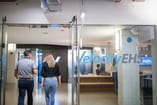How employees collaborate and interact can make a big difference to a company’s results. Although hard to quantify, culture shapes the ideas employees bring to the table, and the extent to which team members grow in their roles. We asked six Chicago tech leaders about what separates great company cultures from the rest.

A Chicago tech leader whose resume includes Orbitz Worldwide, Signal and Narrative Science, Margaret Jastrebski joined ShopRunner to shape a new line of products. But as senior VP of enterprise products, she is also helping shape ShopRunner’s culture. Mindful of how company cultures impact the tech ecosystem as a whole, Jastrebski has actively sought to foster an open dialogue about race and gender diversity.
What initially drew you to ShopRunner?
Our CEO, Sam Yagan, presented me with an amazing opportunity to build an entire line of products for our retailers from scratch. The idea of doing something like that intimidated me, so I decided I had to go for it. I’ve always tried to lean into opportunities that scare me, because those are the ones that teach me the most. The leadership team Sam had assembled is hands down the best in the industry, and he laid out the challenge to build a truly exceptional company in Chicago in terms of culture, inclusion and revenue outcomes. As a Chicago tech veteran of 17 years, I couldn’t say no to that.
What is the biggest factor separating the cultures of great companies from the rest?
Hands down, unwavering courage to be authentic. Companies that are truly honest in what they are and what they are trying to be, without pretense or disingenuousness, are the ones that we as employees love the most. That means not being some watered down version of the best. That means playing to win, not just to avoid losing. That means trusting yourself, your team, your organization and your leadership to be your honest selves when you show up to work every day and face the hard situations. That means sometimes saying: “I don’t know — we’ll figure it out together.”
What is the biggest change you've implemented in your current role?
Empowering my team and the team around us to make decisions. I want them to make choices and take ownership in the outcomes of our efforts. The team prior to us had a bit more of a command-and-control approach that worked well for the original business but doesn’t work for a company in a phase of rapid innovation. We need to divide and conquer, which means we have to operate on much more equal footing.
Additionally, making it OK to talk about race and gender diversity at our company. I know that as part of our leadership team, I am in a great spot to influence. My opinions and perspectives carry just a little bit farther, so I try to use that power for the positive. We live and work in a world that’s out of balance. If I can shine a light on that and make it OK to have a healthy, open dialogue about diversity, inclusion and belonging, then I have no doubt we can start to make a difference in our community — starting with our company.

Marie Tillman founded Mac & Mia to provide a resource for fellow parents crunched for time juggling careers with family obligations. Having launched her company to address a problem partly born out of workplace culture, Tillman has made an effort to avoid contributing to it. Her goal is for employees to be productive during working hours and protective of their evenings and weekends.
When did you realize that you were onto something after launching Mac & Mia?
When we first launched, I could pretty much trace back all of the customers through a friend or family member. As soon as we started getting interest outside of that circle and I heard feedback from complete strangers about how much they loved the service, I knew we were onto something. Now our biggest request is to expand sizes because moms don't want to lose the convenient access to great quality clothes as their kids grow.
Were there any cultural trends you've seen at other companies that you sought to avoid?
Startup culture can be pretty intense with high expectations, a lot of stress and long hours. Many of our employees have families, so while we still have high expectations and things can get stressful, we naturally have a bit more balance because of the nature of our business. People are focused and productive at work, but nights and weekends are geared toward families. We don't expected people to be on email or Slack 24/7.
What makes you most proud about Mac & Mia’s culture?
There’s so much going on now with remote workforces and flex schedules for employees. I read recently that around 31 percent of mothers leave the workforce, often after the birth of a second baby and for an average of 2.2 years. I’ve seen these statistics play out with my own peer group, with so many friends leaving careers because of the lack of flexibility and challenges around the notion of “having it all.”
I love that we’re able to offer an alternative for moms wanting to stay engaged with the workforce. Our stylist team is comprised of predominantly moms who work remotely and can have flexibility with their schedules. They work closely with our customers developing genuine relationships for a truly personalized customer experience. We are a business about families, and that shows in our culture.

A music teacher by training, Groupon technical program manager Emily Wilson took an unexpected career turn into tech after graduating from college — and she was advised to seek out more technical opportunities shortly after joining the company. To Wilson, promoting a culture where employees can to bring their whole selves and grow as people and professionals, is what makes a workplace truly great.
What initially drew you to Groupon?
I was having a difficult time in my job hunt for a position teaching music. My grandmother read about how quickly Groupon was growing and the fun and flexibility of the office environment, and recommended that I apply. I researched the company and learned that the mission was all about building great communities by promoting local businesses.
I had been passionate about my educational policy studies course in undergrad, which was just as much about communities as it was about education, and understood just how disruptive Groupon was for local communities and e-commerce. In short, Groupon was making the kind of impact that I wanted to be a part of. Even on the hardest of days, I've never regretted it
What is the biggest factor separating the cultures of great companies from the rest?
Authenticity. When I joined Groupon, I was a customer service representative working second shift with 11 other people. We all became fast friends because we were able to completely be our authentic selves. My first manager noticed that I had a knack for the technical when I asked if I could spend some time with software developers so that I could better help customers with technical issues. As my career grew, I wanted to build products and systems that empowered employees to reach their full potential, too. We all have different drivers and different skill sets. Staying true to ourselves and having opportunities to learn and grow ignites a feeling of personal ownership over the business.
What is the biggest change you've implemented in your current role?
The biggest change was what led to this new role: combining the engineering team I was managing with another team to create the Global Engineering Operations Development, or GEODe. My team owned a lot of front-end products responsible for growing and supporting our employee base. The other team was a support team that utilizes core back-end services to build mass update scripts and tools to support business objectives across multiple departments.
Both teams shared the same customers — potential and current Groupon employees. Together, what we were able to create was a more well-rounded team with a common vision, exposing our team to more of the engineering opportunities Groupon has to offer. When the time comes for them to transfer from our team to another, they will be able to offer deeper insight into Groupon's architecture and customer experience.

Allison Davis interviewed at closerlook to hone her interview skills for a different job, but she was sold on the company’s culture as soon as she walked in the door. Today she is the company’s chief client officer. To Davis, the biggest factor in a great company culture is a willingness to make mistakes and learn from them.
What initially drew you to closerlook?
Eleven years ago, I decided to interview at closerlook as a practice session for another job that I was convinced I wanted. About five minutes after walking in the door, I knew I wanted to be a part of closerlook. I observed cross-functional teams continuing an energetic debate out the door of a meeting that had just ended, laughing with each other in the kitchen and assessing a bunch of work up on boards. The energy was palpable and I wanted in. I could tell that there was pride in the work, but they didn’t take themselves too seriously and I was drawn to that atmosphere.
What is the biggest factor separating the cultures of great companies from the rest?
Truly great companies don’t allow complacency to set in, and are open to making mistakes and learning from them. There is always room to improve! We have to be willing to try new things and adapt processes. All staff members, no matter what level, need to be open to learning new things. Anyone can contribute new ideas, and we’ve benefited greatly over the years from a culture that encourages our staff to be a part of each step in our evolution.
What is the biggest change you've implemented in your current role?
We were facing a problem with visibility and forecasting, as our clients’ demands and timelines are ever changing and difficult to predict beyond the work right in front of us. We struggled to consistently make good decisions through the highs and lows. I implemented a robust projections calculator that client service teams populate every two weeks with their specific project data. This allows us to track current and forecasted revenue as well as upsell opportunities, and we can make better decisions in real-time based on this enhanced visibility.

A legal tech industry veteran, Jane Oxley joined Smokeball for the opportunity to build a customer acquisition and retention department from scratch. Now the company’s president, Oxley believes the most important trait of a successful company is a culture of openness and transparency, which leads to more opportunities and helps leaderships take problems on earlier.
What initially drew you to Smokeball?
I had worked in legal tech for a long time and knew that when Smokeball was finished, it was going to be the best practice management software for small law firms available, period. I was excited at the opportunity to build the sales, marketing and client success teams to ensure that the great product was matched by an amazing client experience.
What is the biggest factor separating the cultures of great companies from the rest?
A culture of openness and transparency is key. If everyone in your team is empowered to speak up and knows that their voice will be heard, you are going to address small problems before they become big ones. You will also find opportunities you may not have had otherwise. If leadership is equally transparent with goals, strategy and achievements, your team is truly on the journey upwards with you.
What is the biggest policy you've implemented as Smokeball's president?
The biggest impact was getting Smokeball’s culture built into our foundation in from day one. We really live our core values: caring is not optional; innovate for the client, not the press release; and you miss 100 percent of the shots you don’t take. Cultural fit is the first filter in our hiring process. We see the results of our emphasis daily in the interactions between our staff, the way we engage our clients and, of course, in the quality of work we produce.

Stephanie Burke founded Veritas Health to address a lack of reliable third-party information about certain health conditions. In building her company, she has sought to create a culture centered around professional and personal growth — rather than ping pong and long hours.
When did you realize that you were onto something after launching Veritas Health?
I co-founded Spine-health.com with my brother, Peter, in 1999. As a spine surgeon, he found that patients needed a dependable source of information about spine conditions. So our goal was to simply offer accurate information and health tips. That vision grew into Veritas Health, and now we operate Spine-health.com, Arthritis-health.com, Sports-health.com and Pain-health.com. The four sites were developed to provide comprehensive information on back pain, arthritis, sports injuries and chronic pain conditions.
After launching, the most unexpected thing was getting top rankings on search engines right out of the gate. That was a wonderful surprise and a testament to our highly differentiated content.
Were there any cultural trends you've seen at other companies that you sought to avoid?
We have not added trendy ping pong tables or on-site laundry services for our employees. Instead, we have focused on building a place where people can grow both professionally and personally over time. It is important to have balance, because when an employee sacrifices all of their personal time for the company, they burn out. We want healthy, happy and long-term employees.
What is the thing about Veritas Health's culture that you are proudest of?
I am proud that our employees take ownership of the work they do for Veritas Health. We set the bar high and work hard every day to make a measurable impact on the lives of the patients we serve. Our employees are passionate about doing exceptional work, and we hope our work helps our patient readers live healthier and more informed lives.
Images via featured companies.
What sets your company's culture apart? Send us an email or tweet us @BuiltInChicago








